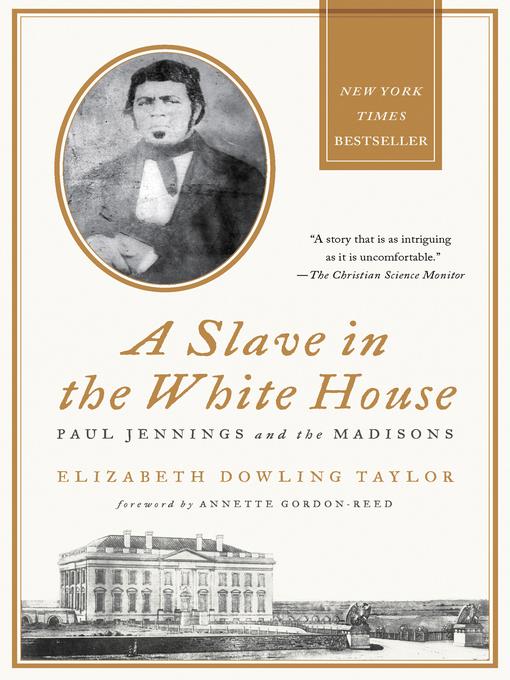
A Slave in the White House
Paul Jennings and the Madisons
کتاب های مرتبط
- اطلاعات
- نقد و بررسی
- دیدگاه کاربران
نقد و بررسی

September 26, 2011
The complex relationship between a president and his bondman abounds in ironies in this revealing study. Historian Taylor reconstructs the life of Jennings, a slave belonging to President James Madison who became his valet, barber and major-domo, bought his freedom from Madison’s widow Dolly, and published admiring reminiscences of the couple. Taylor fleshes out slender sources into a convincing recreation of Jennings’s relatively privileged but precarious existence, setting it against a vivid portrait of the deeply conflicted Madison, a theorist of liberty who lived off of slave labor and a master who prided himself on his paternalism yet broke his vow never to sell his “charges.” At the heart of the story is the tension between the warm human relationship between Madison and Jennings and the remorseless inhumanity of slavery as an institution and ideology; in one tragicomic vignette, Madison declaims into a guest’s ear trumpet about slaves’ unfitness to live free among whites—while his servants studiously pretend not to hear him. Taylor paints a fascinating portrait of slavery, hypocrisy, and one man’s quiet struggle to overcome its injustices. Photos.

October 15, 2011
The former director of education at James Madison's Montpelier debuts with the biography of Paul Jennings, a slave who grew up with the Madisons, was with the former president when he died, gained his freedom and sired many descendants. Because Jennings for much of his life was considered merely property, Taylor had to be satisfied with a skeleton of fact, which she fleshes out with imaginative and thorough research, careful supposition and heavy contextual description. Jennings himself contributed a slim document, included here as an appendix, A Colored Man's Reminiscences of James Madison, which originally appeared in 1863. Throughout, Taylor reminds us of the moral failures of the Founding Fathers, especially their unwillingness to accept the notion that black people should enjoy the benefits of freedom so eloquently expressed in the nation's founding documents. Although Jennings testified to the kindness of Madison, he was still willing to buy and sell human beings. Dolley Madison does not come off so well. We hear about her petulance, excessive spending (she died in near poverty) and wastrel son from her first marriage. One admirable white man does emerge: Daniel Webster, who loaned Jennings the money to purchase his freedom (after Madison died), allowing him to work off the debt. But this is Jennings' story, and the author admirably keeps the focus on him--though there are occasional detours to explore context and speculate. Born in 1799, Jennings somehow learned to read and write and gradually assumed enormous importance in the Madisons' lives--both in Virginia and at the White House, where he was instrumental in saving a portrait of George Washington from the 1814 British assault. In 2009 his descendants met at the White House to honor their ancestor. An important story of human struggle, determination and triumph.
(COPYRIGHT (2011) KIRKUS REVIEWS/NIELSEN BUSINESS MEDIA, INC. ALL RIGHTS RESERVED.)

November 15, 2011
Paul Jennings (1799-1874) was a trusted and resourceful White House slave and valet to James Madison, on whose Virginia plantation he'd been born. After Madison died, Dolley Madison sold Jennings, who purchased his freedom from Daniel Webster in 1847 and became a successful and active member of the African American community in Washington. With evidence painstakingly pieced together from primary and secondary sources, Taylor, who held interpretation and education positions at both Madison's and Jefferson's Virginia estates, chronicles Jennings's life, offering detailed insight into the daily responsibilities, family life, and living conditions of household slaves on Virginia plantations, as well as the challenges faced by enslaved and free blacks in Washington. She also discusses Madison's (and Jefferson's) contradictory and hypocritical beliefs about human freedom, emancipation, abolition, and the colonization of freed blacks. Taylor includes (understandably) speculation about Jennings's actual experiences, but her rich documentation leaves little doubt that Jennings absorbed and was motivated by the discussions of politics and philosophy that he witnessed. Included is a foreword by Annette Gordon-Reed and Jennings's own A Colored Man's Reminiscences of James Madison (1863), the first White House memoir. VERDICT A valuable and illuminating read at all levels; recommended.--Margaret Kappanadze, Elmira Coll. Lib., NY
Copyright 2011 Library Journal, LLC Used with permission.

























دیدگاه کاربران